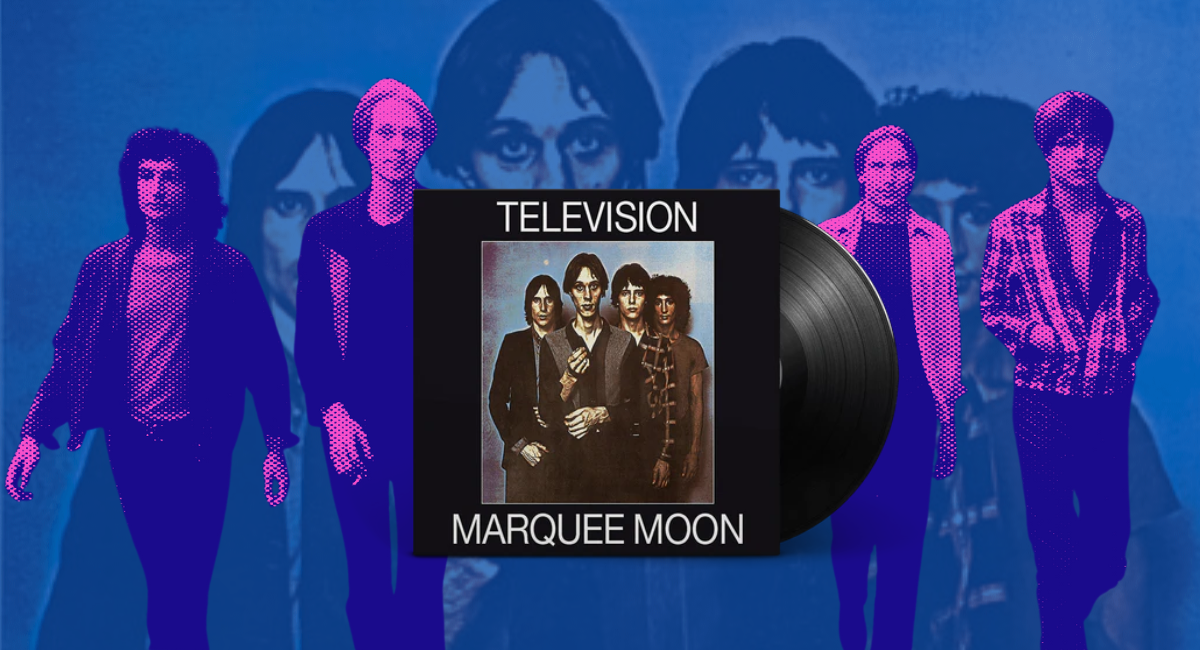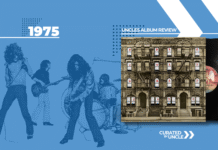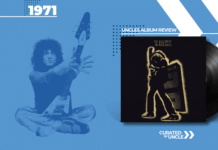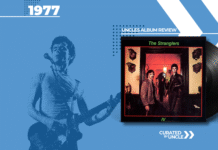Marquee Moon (1977): Punk, But With A Book Club
Marquee Moon is not your typical punk record. It’s what happens when punk takes acid, reads French poetry and learns how to solo without sounding like it’s strangling a cat. It’s intellectual, precise, sometimes infuriatingly delicate and it’s one of the greatest albums ever made.
Imagine being at a punk gig in 1977. There’s sweat, there’s spit, someone’s mohawked scalp is bleeding and then Television walks in like the substitute teacher who actually read Nietzsche and thinks noise should rhyme. While The Ramones were sprinting through 90-second tantrums and the Sex Pistols were vomiting on the Queen’s legacy, Television showed up with guitar strings tuned to existential angst and songs long enough to file taxes during.
Table of Contents
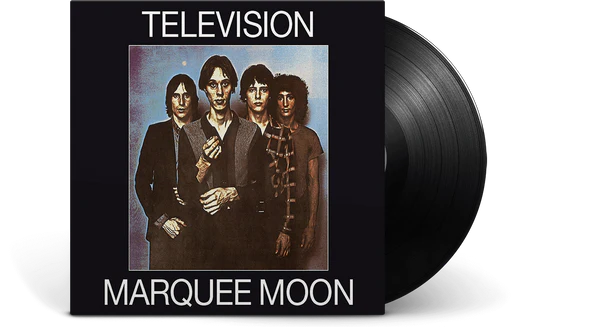
The Lyrical Landscape: Verlaine’s Haikus from a Padded Cell
Tom Verlaine doesn’t write lyrics so much as whisper riddles into a wind tunnel. His words tumble out like overheard conversations between ghosts. On Venus, he murmurs about statues and fate. On Elevation, he sounds like he’s decoding dreams with a migraine. His lyrics aren’t meant to be understood in the traditional sense. They’re to be felt -like a cold draft in an old house or a memory you’re not sure is yours.
In the world of Marquee Moon, metaphors are weaponised and coherence is optional. It’s less “what’s he saying?” and more “how does this make me want to burn my poetry degree and move to a loft in Brooklyn?”
Track-by-Track: A Breakdown for People Who Pretend to Hate Music Theory
1. See No Evil
The opener comes at you like a caffeinated librarian. It jangles, it chimes, it doesn’t explode. The guitar interplay between Tom Verlaine and Richard Lloyd is surgical – imagine two spiders performing ballet on a high-tension wire. Verlaine’s vocals? Half-muttered prophecies from a guy who definitely owns too many turtlenecks.
2. Venus
Not the kind of Venus you’d expect. No goddess of love here, this Venus crashes into the boulevard, babbling cryptic nonsense. “I fell right into the arms of Venus de Milo,” Verlaine sings, probably while staring into the void. The riff is simple but arresting, like a nervous tic turned into a religion.
3. Friction
Here we get Television doing what other punks wouldn’t dare: actual funk. Sort of. The rhythm section, driven by Billy Ficca’s caffeinated drumming, brings muscle to the otherwise cerebral antics. Verlaine’s guitar solo is the sound of someone having a controlled meltdown while trying to retune a satellite dish.
4. Marquee Moon
Ten minutes. That’s how long this thing goes on. TEN. And somehow it’s not only tolerable – it’s bloody transcendent. The title track is a post-punk sermon, a spiraling, open-hearted freakout masquerading as a jam. It never bores. It builds, burns and soars. It’s what happens when a band weaponises restraint until it snaps.
5. Elevation
Possibly the most upbeat moment here, if “upbeat” means “like being lifted out of a coma with a feather duster.” Verlaine’s abstract lyrics and ghostly delivery float over arpeggios that feel like musical déjà vu. It’s dreamy, cryptic, like someone whispering Baudelaire through a guitar amp.
6. Guiding Light
A rare brush with sentimentality. It’s not quite a ballad – more like the soundtrack to a love letter written by someone who keeps forgetting who it’s for. There’s piano (!), and the whole thing has a fragile beauty that you’d never guess came from a band named after a household appliance.
7. Prove It
Weirdly catchy, this one. Like if Roxy Music had joined the FBI. The lyrics are paranoid and fragmented, which is to say: very on-brand. It’s twitchy, cool and dances around pop sensibilities like they’re landmines.
8. Torn Curtain
A finale that practically sags under the weight of its own moodiness. This song is the sound of giving up, but beautifully. Everything’s slow, painful and shimmering with regret. It’s like being hugged by a spectre who once dated Sylvia Plath.
Production: The Sound of Restraint Drenched in Reverb
Television didn’t just record an album – they carved it with diamond-tipped precision. Produced by Andy Johns (yes, the same bloke who worked with Led Zeppelin), the sound is so clean it could pass a health inspection. Guitars sparkle. Drums snap like snare-whipped nerves. And most astonishing of all: there’s space. Beautiful, aching, wide-eyed space.
Every note breathes. Every pause matters. In an era where many punk records sounded like they were mixed in a biscuit tin, Marquee Moon sounds like it was engineered by ascetic monks in a cave of acoustical purity.
Cultural Impact: Punk’s Smarter, Hotter Cousin
Marquee Moon didn’t crash onto the scene with a beer can and a middle finger. It didn’t make headlines, start riots, or even sell particularly well at first. But like a virus or a Radiohead album, it spread slowly and latently infected everything.
This was the album that told punk kids they didn’t need to be dumb to be loud. Suddenly, bands started thinking. Talking Heads, R.E.M., Sonic Youth and even U2 (before they became U2™) all fell under its spell. It rewrote the rulebook by scribbling all over it in poetic gibberish.
If the CBGB crowd were trying to burn down the system, Television were drawing blueprints for the next one – using guitars instead of matches.
Why Marquee Moon Still Matters: Punk With a Soul and a Vocabulary
More than four decades on, this album hasn’t aged so much as become even more relevant – like a cryptic prophecy etched into a bathroom wall. When your average Spotify playlist is an ADHD-driven sugar crash of 2-minute hooks, Marquee Moon lumbers in with ten-minute songs and zero concessions.
This isn’t background music. It’s music that asks things of you. Patience. Attention. A tolerance for metaphorical nonsense. But in return, it offers something few records ever do: a sense that the artists were building something, not just reacting. A cathedral in a genre full of Molotov cocktails.
For Nerds Only: Music Theory Corner You’ll Pretend to Understand
Let’s get pretentious, shall we?
Television did things with guitars that made even jazz musicians pause mid-scowl. The twin-guitar architecture of Verlaine and Lloyd isn’t “lead” and “rhythm” it’s conversation. While one spirals skyward, the other anchors the moment. Chord progressions often sidestep traditional pop formats, with key changes that feel like the floor dropping out from under your expectations.
Billy Ficca’s drumming deserves its own TED Talk – fluid, frenetic, but never flashy. Fred Smith’s bass lines are like tightrope walkers in loafers: calm, balanced, occasionally sarcastic.
If you’re a musician, this album is like watching your crush play chess in a tuxedo – infuriatingly smart and impossible not to love.
Trivia: Deep Cuts for People Who Hate Small Talk
- The title track was recorded in a single take. Drummer Billy Ficca thought they were just rehearsing. That level of accidental genius should be illegal.
- Brian Eno produced their early demos. The band thought it sounded too slick, so they scrapped it. Imagine saying “No thanks” to Brian f**ing Eno*.
- Robert Mapplethorpe shot the album cover. Yes, that Mapplethorpe. Which means your art degree has finally paid off because you noticed.
- Verlaine took his stage name from a French poet. Yes, he was that guy in high school. And yes, he probably made you feel stupid for liking Led Zeppelin.
- “Torn Curtain” almost didn’t make the album. Verlaine thought it was “too soft.” Clearly, even punk intellectuals have a masochistic streak.
My Final Thoughts: Television Didn’t Just Play Music. They Played Chess.
Marquee Moon is one of those records that critics foam over like it’s the Holy Grail of Art Rock and this time, they’re right. It’s a post-punk manifesto with enough swagger to hypnotise guitar nerds and enough moodiness to seduce tortured poets. It’s what happens when a band decides not to compromise, not to dumb down and not to scream for attention – even though it deserved it.
In a world that celebrates immediacy, Marquee Moon is gloriously patient. In a genre known for reckless simplicity, it’s calculated complexity. And in a timeline full of noise, it dares to be… articulate.
So listen to it. All of it. Twice. Then cry a little, buy a guitar and realise you’ll never play like Verlaine. And that’s okay. Some things aren’t meant to be replicated – just revered and played loud enough to scare your neighbour’s poodle.

If You Like Marquee Moon, I Recommend These Albums:
Unknown Pleasures – Joy Division (1979) – Industrial bleakness never sounded so good. If Verlaine made neurosis sound poetic, Ian Curtis made it sound like a death rattle from the abyss.
Entertainment! – Gang of Four (1979) – Punk gets political and paranoid. Less pretty than Marquee Moon, but just as sharp. Imagine Marx reading Rolling Stone while having a nervous breakdown.
Daydream Nation – Sonic Youth (1988) – Noisy, anarchic and sprawling. The lovechild of Television’s structure and the Velvet Underground’s feedback fetish. It’s the album equivalent of yelling “ART!” in a crowded elevator.

Marquee Moon
| # | Track | Duration |
|---|---|---|
| 1 |
See No Evil
Television
|
03:52 |
| 2 |
Venus
Television
|
03:49 |
| 3 |
Friction
Television
|
04:43 |
| 4 |
Marquee Moon
Television
|
10:38 |
| 5 |
Elevation
Television
|
05:05 |
| 6 |
Guiding Light
Television
|
05:32 |
| 7 |
Prove It
Television
|
05:00 |
| 8 |
Torn Curtain
Television
|
06:56 |



